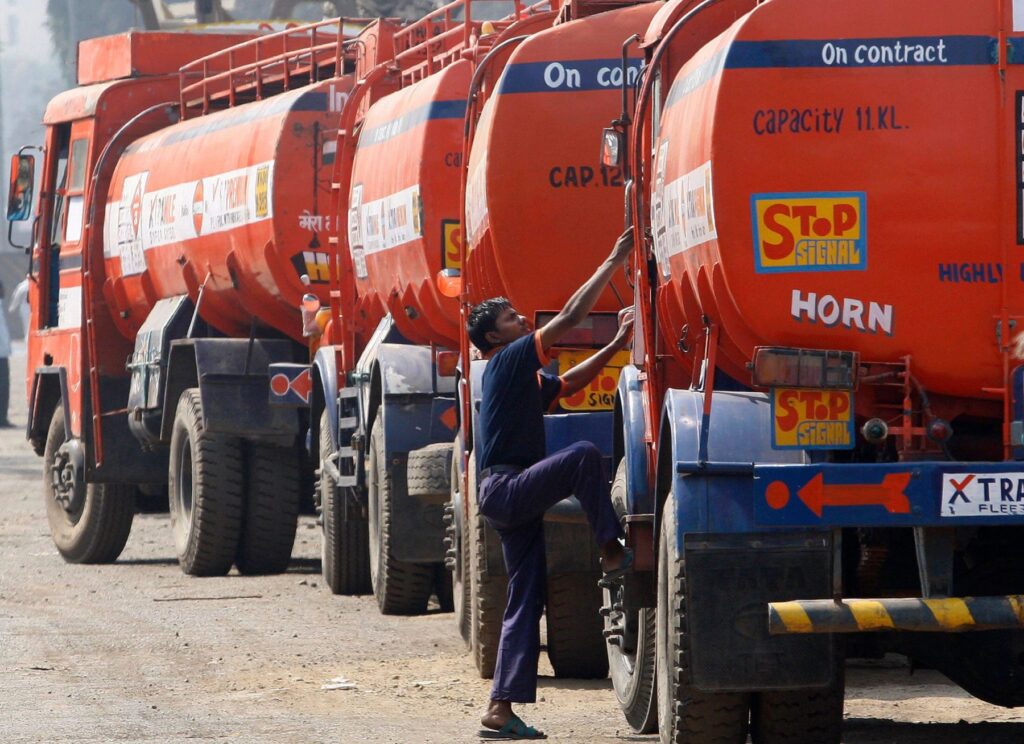Opinion: Fuel Price Crisis Should Accelerate India’s Energy Transition
Mar 25, 2022 | Pratirodh Bureau
Trucks carry fuel into Mumbai (Image: Arko Datta/Reuters/Alamy)
The world economy was still recovering from the Covid-19 pandemic when Russia’s invasion of Ukraine pushed up global oil and gas prices and the cost of food. The war has not only created a humanitarian crisis, but also a financial crisis.
Russia is the world’s third-largest oil producer (behind the United States and Saudi Arabia) and the second-largest crude oil exporter (behind Saudi Arabia). It is also the second-largest gas producer – 12% of oil and 17% of gas comes from Russia.
Global prices of crude oil, gas and coal have hit the roof. Because most economies still depend on fossil fuels, inflation is also rising worldwide. Further, the financial markets have tanked and currencies have depreciated. Governments are using their strategic reserves to cool off prices, but in vain.
The solution to this dilemma is renewable energy, which in India is cheap and potentially abundant.
War Leads To Economic Turmoil In India
India, which imports 80% of its crude oil and 45% of its natural gas, is experiencing price shock waves. The war is leading to shortages and rising prices of food crops including wheat, corn and sunflower. Further, Russia is an export hub for rare metals like nickel, platinum, palladium, steel, iron ore, gold and more. Sanctions against Russia have now prevented these metals from reaching the global market. The shortages and increase in prices of such products is driving up food inflation and increasing manufacturing production prices. As a result, retail consumer prices and wholesale prices have both taken a hit.
India will be burdened with a huge current account deficit – where the value of imported goods and services into the country surpasses the value of what it exports. Retail inflation was at 6.07% in February, breaching the Reserve Bank of India’s 6% policy comfort zone, despite the government not passing on the surge in energy prices caused by the Russian invasion to consumers.
The rise in commodity prices sold in bulk (wholesale inflation) also increased to an all-time high of 13.11% in February, implying that the year will end with double-digit inflation.
The government of India has not revised petrol and diesel prices since November last year. This has caused huge losses for state-owned oil companies of about INR 20 per litre when the global price benchmark for crude oil hit USD 139 on 7 March. On 15 March, crude oil tumbled below USD 100, bringing some relief and reducing the need for a sharp hike in fuel prices.
The government is working on different options to bridge the gap: either lowering excise duties (indirect taxes on the sale or use of specific products, such as alcohol, tobacco and energy) or trying to clinch a deal with Russia. This would involve importing 3.5 million barrels of crude oil at a discounted price, with Russia covering the costs of shipping and insurance.
In the past one to two years, volatile global gas prices have led to a massive increase in the fertiliser subsidy burden, and the fiscal deficit. With a large proportion of the population dependent on agriculture, India relies heavily on imported liquified natural gas (LNG) to produce fertilisers. The fuel price crisis means the subsidy is expected to increase by another INR 100 billion (USD 1.3 billion) from the revised estimate of INR 1,400 billion (USD 18.5 billion) for the current fiscal year – an increase of 7% of the total subsidy burden.
Renewables Offer India A Better Way
Recent global events have revealed that reliance on imported fuels can be expensive, risk energy security and can dampen economic growth. India should fuel its economic growth by substituting coal, oil and gas demand with renewable energy alternatives.
Any incremental and existing demand should be met through cheap renewable energy. Renewable energy in India is available at INR 2-2.5 per kilowatt-hour. With the price of renewable energy, battery storage and electric vehicles decreasing, the competitiveness of fossil fuels will be further compromised.
India is decarbonising its electricity sector, but more impetus should be given to the decarbonisation of transport and other hard-to-abate sectors like steel and fertilisers, through prioritising new technologies like green hydrogen.
The Indian government has a target to increase the share of gas in India’s energy mix from 6% in 2021 to 15% by 2030. But to meet its energy demand, rather relying on gas as a transitory fuel India can build renewable energy capacity. Gas infrastructure requires massive capital expenditure, and any investment into it risks becoming a stranded asset – where the assets will be underutilised, leading to difficulty in payment of debt by the project developers.
Similar problems would arise if policymakers double down on domestic coal production. As well as being expensive, there are practical issues such as railway transportation or mines flooding. Because of these problems, getting finance for coal projects is increasingly difficult. Such investments should therefore be directed towards building an economy based on renewables.
Further, the development at scale of green hydrogen, which uses renewable energy to make green ammonia to produce urea and other fertilisers, will be critical for decarbonising farming and insulating India from expensive LNG imports and a high subsidy burden.
India is on the right path, but we need to accelerate the energy transition now. The building blocks for a low-emissions future are being put in place. Both the public and private sectors are upbeat about being part of the transition journey. Developers and investors now need to be confident in stable and robust policies that do not change with political upheaval. Once that is ensured, there is no looking back. (TheThirdPole)
